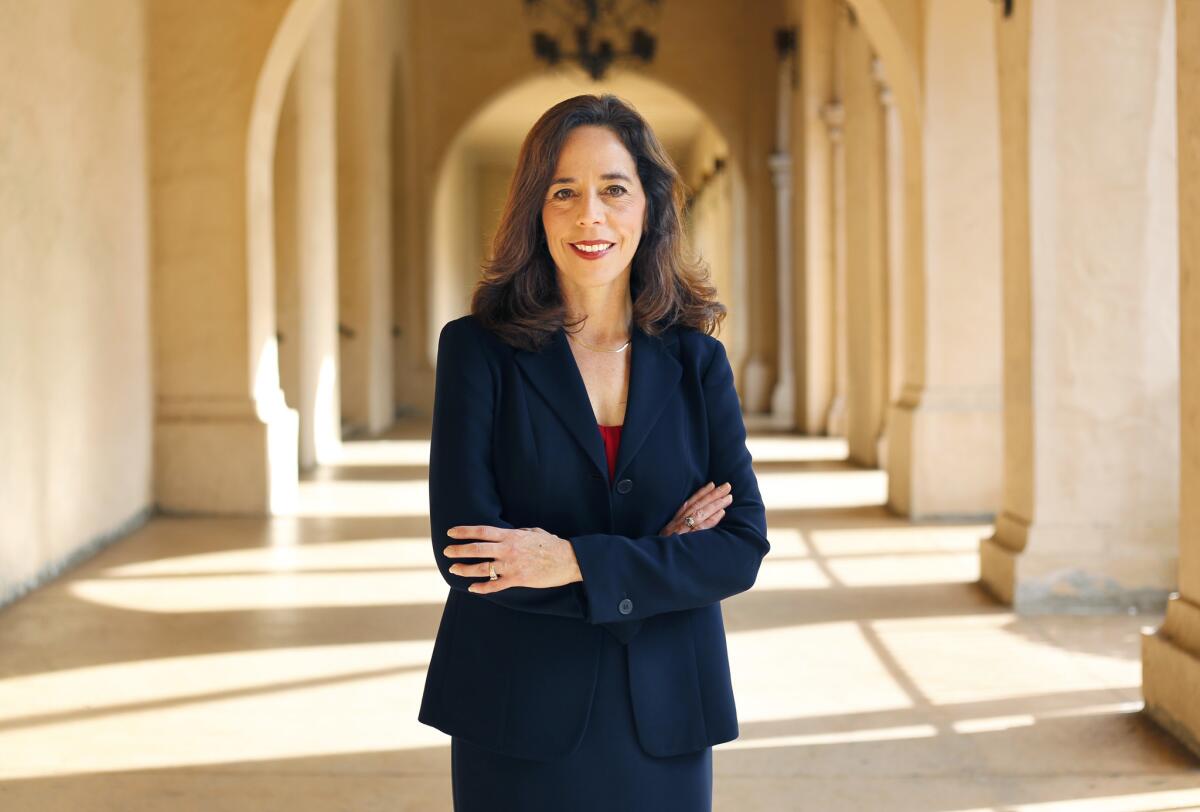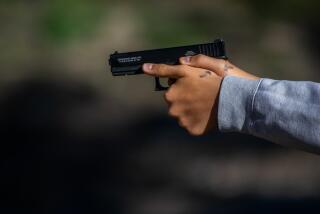San Diego’s city attorney is taking away hundreds of guns from those who shouldn’t have them

- Share via
SACRAMENTO — Mara Elliott was dropping her two boys off at school when she heard every parent’s worst nightmare over the car radio. Students her children’s age had been massacred by a crazed shooter in Connecticut.
She soon became a gun control crusader.
At the time — December 2012 — Elliott was a San Diego deputy city attorney specializing in finance and contracts. “Guns were not in my lane.”
But at Sandy Hook Elementary School in Newtown, Conn., 20 children ages 6 and 7, plus six adult staff members, were killed by a mentally disturbed 20-year-old wielding a military-style assault rifle with 10 high-capacity ammunition magazines. Before shooting up the school, Adam Lanza had killed his mother. Afterward, he killed himself.
“I remember thinking, ‘I’m entrusting a school with my children. Did it have the right safety measures in place?’” Elliott says.
“I took it as a calling to do everything I could. If you really want change, you have to be part of making change.”
Elliott, a UC Santa Barbara graduate with cherished memories of her college life, also was motivated by the 2014 killing of seven people and wounding of 13 by a young mentally ill misfit in the campus community of Isla Vista.
So in 2016, Elliott ran for San Diego city attorney and won, promising to be a champion of gun control. She specifically pledged to seek firearms restraining orders against gun owners who showed signs of potential violence.
Today, the 51-year-old Democrat is California’s most aggressive planter of so-called red flags on suspicious gun owners who act like they shouldn’t be anywhere near a firearm. The goal is to seize guns from wackos.
Under California’s red flag law, enacted in 2014, a law enforcement official or immediate family member can ask a judge to issue a Gun Violence Restraining Order if a gun owner is feared to be a danger to himself or others. If the order is issued — and it almost always is — the gun owner’s weapons will be seized by law enforcement for up to a year. After a year, the restraining order can be renewed.
Elliott was the first to create a restraining order program. So far, she has obtained roughly 300 orders and 400 firearms have been seized, including roughly 40 assault weapons.
Many of the orders were issued against stalkers. Some were substance abusers. Others were suicidal. And some were struggling with mental health problems, even dementia. A few had threatened violence at work or at school.
One man threatened online to shoot up a gay bar and then kill himself. When police retained him, he repeated the threats.
Another told family members he was going to kill Muslims. He also hated administrators at the school he attended and wanted to “kill them all.”
Yet another got into an online argument about illegal immigration and left several threatening voicemails.
UC Davis firearms researcher Garen Wintemute says such cases illustrate the potential benefit of gun violence restraining orders.
“Eighty percent of the time, shooters declare their intent through social media, friends or family,” he says. “There are people who know something is going on.”
“The poster child was Parkland,” Wintemute adds, referring to last year’s killing of 17 at a Florida high school by an expelled student firing an assault weapon. “An acquaintance of the shooter went to the FBI and said, ‘I think this guy is going to shoot up the school.’ Nothing got done and he shot up the school.”
Unfortunately, law enforcement in the rest of California hasn’t been as enthusiastic about red flagging as San Diego has.
“Some think it’s more difficult than it actually is,” Elliott says.
Because of her success, then-Gov. Jerry Brown and the Legislature gave Elliott $50,000 last year to teach other law enforcement agencies how to use the restraining orders. This year, Gov. Gavin Newsom and lawmakers upped it to $250,000.
California is one of 17 states with red flag laws. The U.S. Senate is sitting on a bill that would offer federal grants to states seeking to enact and enforce their own laws. It will probably pass.
In Sacramento, legislation is pending that would expand California’s statute.
One bill would extend the length of the firearms restraining order from one year to five. The measure, AB 12 by Assemblywoman Jacqui Irwin (D-Thousand Oaks), has passed the Assembly and is in the Senate. Democrats support it. Republicans are opposed.
Another bill, AB 61, would allow an employer, co-worker or school employee to request a restraining order.
“We’re trying to get guns out of the hands of bad people,” says the author, Assemblyman Phil Ting (D-San Francisco). “It makes sense that people have a right to go to work or school without getting killed.”
That bill was twice vetoed by Brown, who charted a middle course on guns — signing some measures, rejecting others. Newsom’s more committed to gun regulations.
Now Ting’s proposal has passed the Assembly and is in the Senate, supported by Democrats and opposed by Republicans.
Meanwhile, in court, some of California’s biggest gun controls are being defended against the firearms lobby by state Atty. Gen. Xavier Becerra. They include a ban on possession of large-capacity magazines and a requirement that ammunition be purchased in person from a licensed dealer.
California has arguably the nation’s toughest gun laws. What else is needed? “We need other states to catch up to California,” Becerra says.
Other states should start by following Mara Elliott’s red flag.
More to Read
Sign up for Essential California
The most important California stories and recommendations in your inbox every morning.
You may occasionally receive promotional content from the Los Angeles Times.











